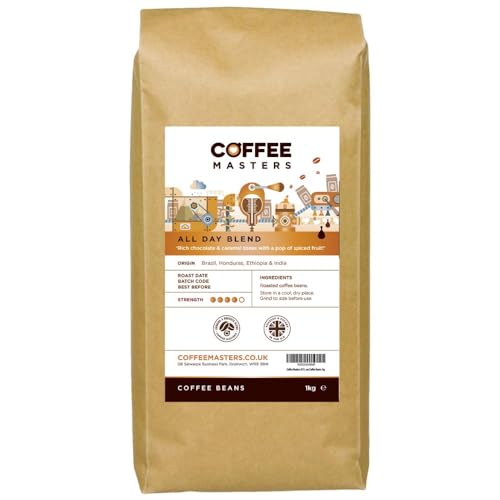
24
July5 Laws That Anyone Working In Coffee Beans Types Should Be Aware Of
Coffee Bean Types: Arabica, Robusta, Liberica, and Excelsa
If you're a lover of coffee you're likely aware that different beans have distinct flavor profiles. Read on to learn about four of the most well-known varieties: Arabica, Robusta, Liberica, and Excelsa.
Excelsa beans, a variety of Liberica that is grown only in Southeast Asia. They have a fruitier and more tart flavor and are often utilized in blends of beans to give them added depth.
Arabica
Arabica is the most sought-after coffee in the world with 75% of the world's coffee beans produced. Arabica beans have a milder and sweeter flavor than Robusta and are available in a variety of flavour profiles. The aroma and taste of a coffee can vary in a wide range depending on the cultivation conditions and processing techniques employed to produce it.
The word "coffee" originates from the Arabic word meaning berry. Coffee beans are actually seeds that sprout inside bright red berries. It is believed that ancient Ethiopian shepherds discovered that their goats were stimulated after eating these fruit, and the cultivation of coffee quickly was a global phenomenon.
Coffee beans can thrive at high altitudes and flourish in cold temperatures and lots of rain. This is the reason Arabica coffee is considered to be the best tasting kind of coffee.
Many specialty coffee shops and roasters concentrate on the ethical source of arabica Ferraris Coffee: Premium Fairtrade Certified Mount Elgon Beans, and focusing on fair wages for farmers and sustainable farming practices. These companies blend arabica beans to create unique signature coffees, which can be used in many different brewing techniques. Blending allows control over the taste, aroma and body as well as acidity of coffee. It is often preferred to achieve an even and consistent taste that appeals a wide market.
Robusta
Robusta beans are the second most coveted type of coffee bean around the world. They have more caffeine per bean and are more resistant against diseases and pests. They also have higher levels of chlorogenic acids that are antioxidants found naturally. However, these acids can cause oxidation during the process of brewing coffee and can cause undesirable flavors.
The plant is more resilient than the arabica, and can thrive in less favorable conditions. It can withstand temperatures that are higher and does well in direct sun. It grows faster and produces more coffee per plant than arabica, which makes it a cheaper crop to cultivate.
While it may sound counterintuitive however, coffeee.uk arabica and robusta beans are often blended to create coffee blends. If you see names like Uganda or Kenya on the coffee bags, it's possible that there is also some robusta.
Although some roasters exclusively use arabica beans, the majority of roasters use mix the two varieties to reduce costs and preserve quality. To preserve the quality of the flavor, it's essential to select a top-quality beans from a source you are confident in. This can be done by buying your beans directly from farmers.
Liberica
Liberica beans have a shape similar to a football, which makes them different from other types of coffee beans. They have a unique aroma that is fruity and floral with subtle smoky undertones. They are often added to other bean varieties to add the fuller, more robust flavor.
Liberica coffee beans are grown in West Africa and Malaysia (Borneo) as and in Southeast Asia. They can be found at low altitudes and tolerate hot, humid climates. They are also more resistant to diseases than Arabica or Robusta.
These qualities make them ideal for growing at home. You can purchase seeds online from many sources, but it's preferred to purchase them from local producers to ensure the quality of the beans. The ideal conditions for the cultivation of Liberica coffee plants include fertile deep volcanic soils with moderately acidic pH and adequate annual rainfall.
Another type of coffee bean is Excelsa that was once thought to be a separate species, but is now classified as a variant of Liberica. These coffee beans are elongated ovals that grow on large 20-30 foot coffee plants that are situated at medium altitudes. Their distinctive taste is sweet and tart, making them a popular choice for blends made at home. They have a milder scent and a lower caffeine content that is less than Arabica or Robusta but they do possess a distinct depth of flavor.
Excelsa
Although they're the fourth most sought-after type of coffee beans Excelsa beans aren't quite so easy to locate as Arabica or Robusta. They were actually thought to be distinct species of coffee up until 2006, at which point they were reclassified to become a synonym for Coffea Liberica var. dewevrei. They are produced in Southeast Asia today and account for 7 percent of the world's production of coffee. The coffee beans are shaped in the shape of a teardrop and are dark and mysterious in taste. They're frequently used in blends to provide extra body and a full, tart, ripened fruit taste.
Arabica beans are the most sought-after, and are well-known for their a sweeter taste. They thrive at higher altitudes and enjoy warm, tropical climates. They also have a bit of acidity. When properly roasted and brewed, they can have notes of chocolate, nuts, or even fruit.
Robusta is the second most popular coffee in the world and is responsible for around 40% of the coffee consumed around the world. Robusta beans are smaller and more round but they have twice as much caffeine as Arabica. They also have more bitterness than the other two varieties, and tend to have woody and earthy undertones.
 Now that you've learned the four most widely used varieties of coffee beans and the four most popular types of coffee beans, it's time to select your perfect brew. If you're looking for a smooth and delicate taste, go for an arabica bean or a blend of robusta and arabica beans.
Now that you've learned the four most widely used varieties of coffee beans and the four most popular types of coffee beans, it's time to select your perfect brew. If you're looking for a smooth and delicate taste, go for an arabica bean or a blend of robusta and arabica beans.


Reviews